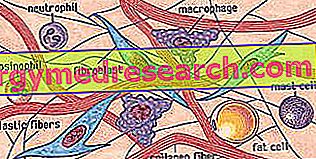
Encephalopathies are a group of pathologies that determine a structural and functional alteration of the brain . In other words, they are neurological diseases .
Congenital or acquired, an encephalopathy can last a lifetime ( permanent encephalopathy ) or may have a more or less important margin of healing ( temporary encephalopathy ).
The various types of encephalopathy differ from each other due to the triggering causes - to which they usually owe their names - for the symptoms, for the complications, for the treatment and for the prognosis.
A usually temporary form of encephalopathy is the so-called Hashimoto encephalopathy, which is so called because it is a complication of an autoimmune disease known as Hashimoto's thyroiditis .
Hashimoto's thyroiditis is a chronic inflammatory disease that affects the thyroid, or the butterfly-shaped gland located in the anterior region of the neck and secreting thyroid hormones (T3 and T4) and calcitonin.
To cause the inflammatory process characteristic of Hashimoto's thyroiditis is a malfunction of the immune system, which, once altered in function, produces anti-thyroid antibodies . For those who are not aware of it, the immune system is the body's defensive barrier against pathogens and other threats present in the external environment.
As you can guess from the name, anti-thyroid antibodies attack the thyroid and jeopardize its function; this leads to a reduction in blood levels of thyroid hormones and the onset of a pathological state known as hypothyroidism .
Described for the first time in 1966, Hashimoto's encephalopathy is a fairly rare complication and still presents some unclear aspects, such as the exact pathological process that leads to its appearance only in some individuals.
In this regard, some researchers claim that the same malfunction of the immune system at the origin of the homonymous thyroiditis plays a decisive role.
From an epidemiological point of view, the disease usually arises around the age of 47-50 and is of greater interest to the female sex .
SYMPTOMATOLOGY
In general, the symptoms and signs of Hashimoto encephalopathy appear within a few weeks or months .The typical clinical picture consists of:
- Extreme drowsiness
- Balance problems
- Manifestations similar to those of a stroke (partial paralysis of one side of the body, problems with language, etc.)
- Neuro-psychiatric disorders (unusual aggressiveness, psychosis, personality changes etc.)
- Convulsions and episodes of epilepsy
- Disorientation
- Headache
- Tremors
- Memory loss
- Coma



